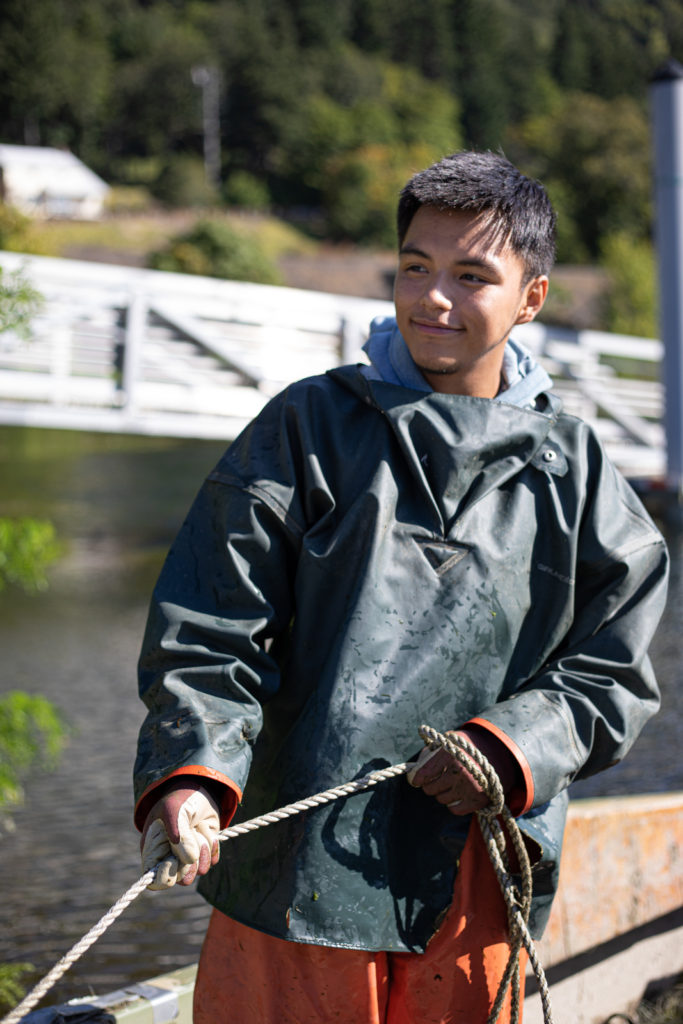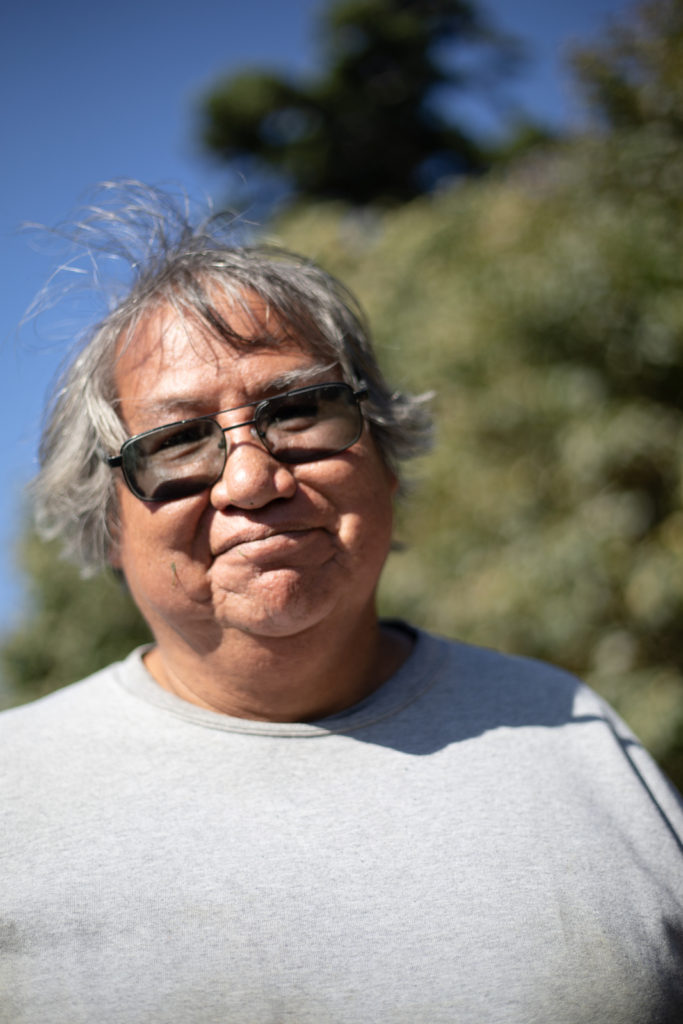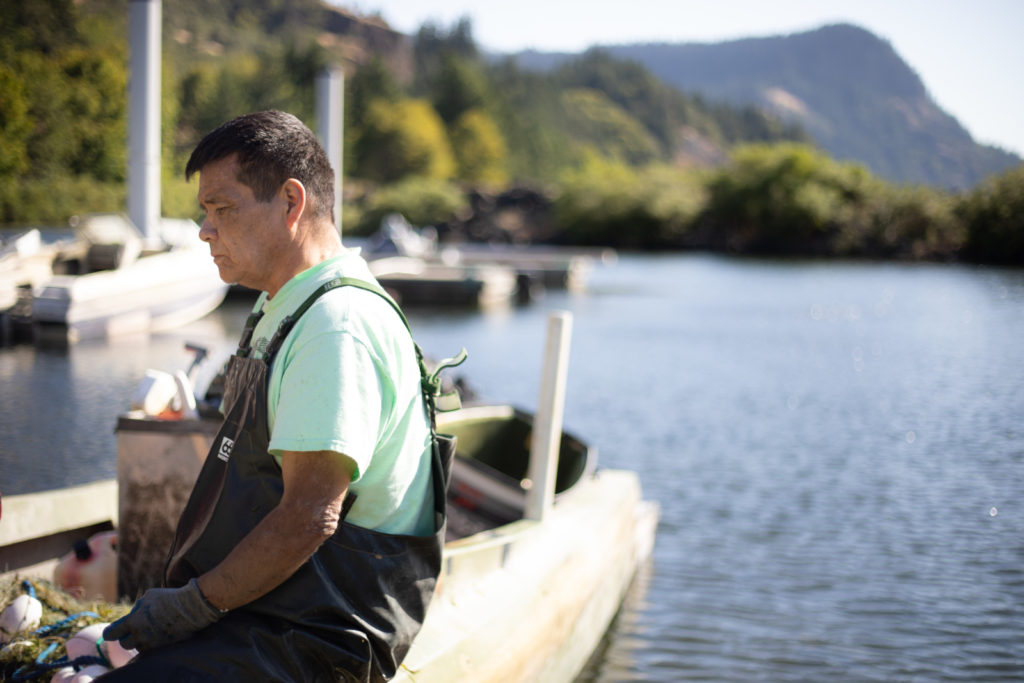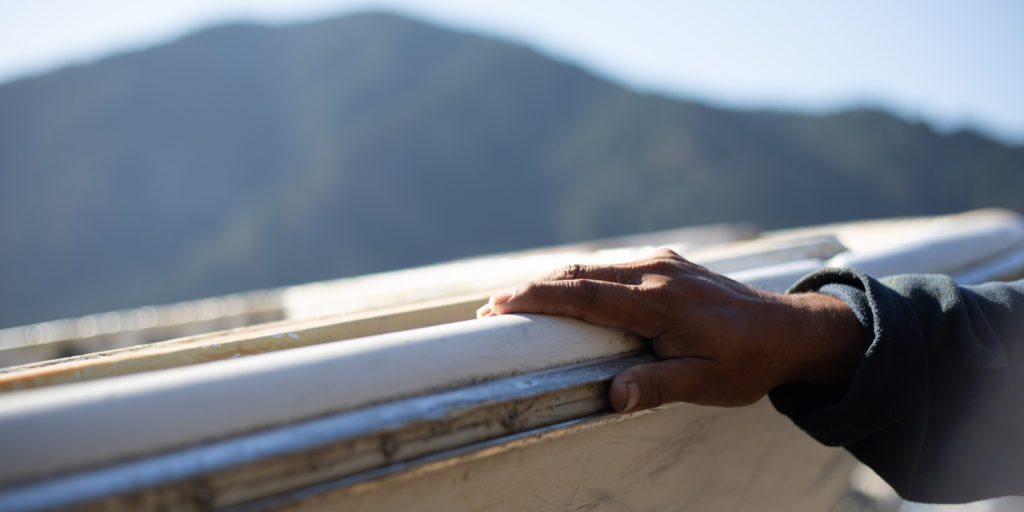Emily Washines and Intisar Abioto will be participating in a talk and slideshow about Yakama fishing traditions and the 50th anniversary of the Sohappy v Smith ruling at a free event 7 pm Tues. Dec 3 at the Yakama Nation Cultural Center Heritage Theater in Toppenish, WA
Fifty years later, Yakama activists remember the fight for native fishing rights
Cooks Landing is a tiny fishing village on the north shore of the Columbia, not far from where the Little White Salmon River meets the larger river. It’s a Wednesday morning as David Sohappy Jr. leans against a fish tote and discusses the latest news in serious terms punctuated with sharp wit. His family was in Fish Wars that began fifty years ago and affirmed treaty fishing rights with state and federal governments. Both David and his father, the late David Sohappy, Sr., had been arrested and served time in federal prison for asserting their right to fish as their ancestors had. Now Sohappy’s life along the river connects new generations of Yakama people to ancient traditions.
On this August day, I’ve joined three people in a boat on the Columbia River, or “Nch’i-Wàna,” as it is called by the Yakama, who are based in a 2,000-square mile reservation in central Washington. It’s brisk and a little windy as the crew heads out to check on four gill-nets. In addition to David Sohappy, Jr., I’m joined by his brother Andy Sohappy, and Kyle Brisbois, a 22-year-old man who’s also a member of the Yakama tribe, Each of us will help with the fishing.
The boat moves across the water, as the fishers crouch and hold on. “Why do Indians always stand up on boats?” David Sohappy, Jr. says, sharing a question his grandson was once asked by a non-native friend. Laughter fills the boat. The inside joke is that tribal fishing boats often don’t have seats, in order to make room for more fish.
We’re participating in a practice that has deep roots. The Yakama people have been fishing for salmon on the Columbia since time immemorial.
Sohappy turns the boat and water sprays droplets of water across my face. “There, now you’re baptized,” Sohappy says with a smile as he steers us toward the first net. The sun glistens to illuminate the wide river ahead. “Kyle’s been with us since he was a lil’ guy,” David says, referring to the third member of the crew.

Years ago, when Kyle Brisbois was a child, he told Sohappy: “They won’t let me on the boat! They say I don’t got muscles!” At the time David Sohappy replied to the boy, “I’ll let you on, come on.”
With a big smile, Brisbois now recalls, “I must’ve been 38-40 pounds tops!”
The details of the civil rights struggle for treaty fishing rights, as well as life on the river for tribes today remains little known to many non-native people. For example, the 14 Yakama fishers who went to court in federal fishing cases beginning in 1968 are are rarely referenced by name, even when the Columbia River tribes talk about the contemporary fishing rights movement. This year marks the fiftieth anniversary of a complicated court victory involving federal, tribal, and state management of fish. Those 14 fishers were cited for fishing out of the “official” state season at various sites on the Columbia River, including the place we are fishing today.
These are the names of those involved in Sohappy v. Smith: Richard Sohappy, Aleck Sohappy, David Sohappy, Myra Sohappy (David and Andy’s mother), Clara Sohappy, James Alexander, James Alexander. Jr., Leo Alexander, Clifford Alexander, Henry Alexander, Andrew Jackson, Roy Watlamet, Shirley McConville, and Clarence Tahkeal. For the purposes of the case, they are collectively known as the Yakama Fishers, with David Sohappy Sr. also identifying with his Wanapum lineage.
In 1968, the fishers were tired of the state trying to assert authority over treaty fishing rights and so challenged them in an act of civil disobedience. In 1969, a federal court in Oregon ruled in favor of the Yakama fishers and reaffirmed tribes’ treaty rights to fish in the “usual and accustomed places” they had frequented on the Columbia River for millennia.
There are many layers to this history of the Fish Wars in the Northwest. Earlier in August I took part in an event to talk about that history.
River Walk
At Columbia Hills State Park alongside Horsethief Lake and the Columbia River, more than 200 people gathered to commemorate the fiftieth anniversary of the Yakama fishing case. It’s a warm summer day and people are viewing the petroglyphs along the river. “That’s my Pusha,” says Troy Watlamet, Yakama Nation Cultural Specialist co-leading tours. He uses the Ichiskiin name for his paternal grandfather, Roy Watlamet, who was a plaintiff in the case. Each step we take honors the fishers.
The meal begins with a traditional song and opening remarks. “Thank each and every one of you. He wasn’t thinking about himself; he was thinking about the young fishers here,” says David Sohappy, Jr., sharing River People teachings. “My father’s gone, but he lives on through his children, grandchildren, and great-grandchildren.”
Family members are called up to receive commemorative posters honoring their relatives who were involved in the case.
Sean McConville, a business owner and fisherman who’s the son of the late Shirley McConville says, “They’d fish out of Rufus and Maryhill,”–two sites on the Oregon and Washington sides of the river.
It was the fishers who led the way. “There was concern by some about going against state law,” says Andy Sohappy, explaining the case law and how it was a group of fishers—not the tribal leaders—who first broke trail in the landmark consolidated case of Sohappy v. Smith/U.S. v. Oregon.
The fishers had help from a fishing rights advocate and author. “Hank Adams asked them to stay in jail while he went back east to get money,” says Wilbur Slockish, a Yakama elder and fishing rights advocate. There was a nationwide network of support, Hank Adams tells me in an e-mail: “Sylvia Drew (Ivey) approved funding 1968-1969 Sohappy v. Smith, leading to [the] Belloni Decision of July 1969. I flew to New York City to meet with Ms. Drew and with Jack Greenberg of the NAACP Legal and Education Defense Fund to request a funding package for treaty fishermen on the Columbia River and on Puget Sound.”
This national support meant there were six attorneys representing the fishers. Their order of appearance on the court documents are: Robert A. Bennett, Jack Greenberg, Melvyn H. Zarr, David R. Hood, Donald J. Horowitz, Ralph W. Johnson. Decades have passed since the case, but memories of the fishers remain.

“How could you forget a name like that?” says Don Horowitz, an attorney on the case. He’s chatting with me on the phone to talk about Sohappy v. Smith. Though few sources mention the women who were plaintiffs, Horowitz recalls that, “Women were a very strong and important part of the case.”
He also remembers the generosity of the fishers. “I had some of the best fish I ever had in my life!” Horowitz says.
The fishers, attorneys, and advocates all worked together to create a legal strategy that resulted in the Belloni Decision and the Boldt Decision, two landmark fishing cases that changed how state and federal governments recognized native fishing rights.
For the Yakama People, these cases drew upon the Treaty of 1855, which reserved rights including hunting, gathering, and fishing within their reservation, ceded area, and all usual and accustomed places (12 Stat 951). This had been re-affirmed in a U.S. Supreme Court case in 1905 called U.S. v. Winans. That century-old case was recently tested in the U.S. Supreme court case Washington v. United States (2018), also called the culverts case. The tribes won, and as a result the state of Washington will be required to fix hundreds of stream culverts across the state in order to improve fish habitat
Where does the lack of understanding tribes and their rights stem from?
There were decades of state and federal decisions that undermined tribal rights.
As a part of federal policy in the 19th and 20th centuries, the government forcibly removed children from their homes and put them boarding schools in a violent practice of assimilation. To continue to follow Native American traditions, religions, or even speak Native languages was not protected by law until the 1978 passage of the American Indian Religious Freedom Act.
During this time, little was understood or accepted about the Columbia River People. Generations of Native people were forced to either assimilate or practice their religion in hiding. It would be as if, in western society, Christmas could not be publicly practiced without prosecution until the late 1970s. The long-term effect of these restrictions meant that cultural traditions and history were erased or forgotten by the larger population. Still, there remains a richness in the Yakamas’ living culture that stretches back thousands of years—resources such as salmon are integral to their way of life.
There is a reason they call this time the Fish Wars. There were loses. In 1968, with two tribal fishers in jail, others participated in what is referred to as protest fishing.
“My father was James Alexander Jr.,” says Adrienne Givens. “He passed when I was 3 years old. I have good memories of him and my home at the Little White Salmon.”
While a plaintiff in a federal case, Alexander drowned trying to escape state officials attempting to enforce their regulations over tribal fishers. Harassment continued even after the fishers won the case.
U.S. Commission on Civil Rights
1978 was nine years after the Sohappy v. Smith decision and a year before the Boldt ruling would be upheld by the U.S. Supreme Court. At that time, David Sohappy Sr. and his father Jim testified before the U.S. Commission on Civil Rights. “All this time I’ve been fishing down there, I’ve been harassed by the game [department] and department of fisheries, confiscating my gear at nights…I go up there and claim my nets: they say, “No.” They just steal it. They don’t give you no kind of ticket or anything,” said David Sohappy, Sr. who had at least 230 nets taken.
Within two years of this testimony, the state and federal government worked to pass the Lacey Act Amendment, which included prosecution of tribal fishers. Before its passage, they begin a sting operation called “Salmonscam” which leads to the federal court case conviction U.S. v. Sohappy (1983). The fishers were originally blamed for 40,000 missing fish that were later found alive. State and federal officials discovered that 40,000 salmon had moved from one dam checkpoint but not another. Since the tribal fishing village was in between, officials blamed tribal fishers for poaching the fish. However, the salmon were later found alive in a tributary, and it was found they had been prevented from migrating up the Columbia River due to an illegal fluoride spill from an aluminum plant; one that has yet to be cleaned up.

David Sohappy, Sr., along with his son David Sohappy Jr., Wilbur Slockish, Mathew McConville, and Leroy Yocash, were charged in a case overseen by Judge Tanner. That same year, American Lawyer magazine named Judge Tanner “the worst federal judge in the West.”
In asserting sovereignty by claiming the fish taken, the Yakama Nation prosecutes the fishers. The fishers faced the same charges in a tribal court case Yakama Nation v. Sohappy (1987) also referred to as Tradition on Trial.
In his 1987 closing argument, Defense Attorney Tom Keefe questioned why this government agency was enforcing rules so far upriver: “The primary jurisdiction and authority of the National Marine Fisheries Service is to regulate the ocean trollers.”
“In 1979, in 1980, in 1981, your tribal biologist had to file affidavits in court,” Keefe tells me. “Your tribe had to sue. The trollers were still taking too many fish, still taking too many out of the runs headed back to the river, still not being properly regulated.”
The government convicted the fishers for taking a few hundred fish while the tribe faced a deficit of 25,000 fish. “Those are some of the 25,000 “paper fish” that you were being asked to have instead of salmon for your tables, salmon for your longhouse, salmon for your elders.”
The tribe acquitted the fishers, asserting that they had been wrongfully entrapped by the state and federal governments. To this day, this case is the longest running jury trial in Yakama Nation court. Even though they were found innocent, the federal government ignored the tribe’s sovereignty and demanded the fishers be taken to federal prison.
U.S. Senators from Washington and Oregon helped advocate for the fishers. After the fishers were returned to a federal penitentiary, Senator Daniel Inouye of Hawaii publicly pointed out how the sentences violated standard sentencing ranges. Upon his release after 20 months in prison, David Sohappy, Sr. spoke in the Ichiskiin language to the cameras, “Ink nash waniktsha Tucknashut (my name is Provider).” Then he broke down crying. It’s an emotional moment that captures the culmination of the long-fought treaty rights battles. In this moment, Sohappy demonstrated that even though it had been a difficult ordeal, the experience had not completely broken his identity.
David Jr. reminisces about what they talked about while in prison, waiting to come home. “Yeah dad, we’re going to do some real father-son things: we’re gonna go fishing.”

The Yakama fishers’ long journey also included filing suit against the state of Oregon (Sohappy v. Smith), a suit that helped pave the way for the 1974 Boldt decision that allocated half of all salmon harvests to the tribes.
Three fishermen return to the dock. Jay Palmer is the grandson of the late James Alexander, Sr., a plaintiff in the Sohappy v. Smith case. Tom Henry is hobbling along, not letting an injury keep him from the water. Gabriel Winnier, whose hair is held back by a bandana, is guiding the boat. Despite all that this fishing village has been through, they continue on with tradition.
Who is Smith?
Overlooking the Columbia River, there is a mural of the fishers created by artist Toma Villa. All around the building there are flyers about the River Walk with the words “Sohappy v. Smith.” boldy displayed. The younger generation in attendance is confused seeing their family name in this context. “I had to explain that v means versus,” says David Sohappy, Jr. “Next, this little guy goes around asking, where’s Smith?” McKee A. Smith was a fishing commissioner and the lead defendant for the State of Oregon in the case. “He’s been going around here looking and waiting for Smith,” David says with a chuckle. He imitates the youth walking around with his arms moving quickly and on high alert.
It’s just another way that a new generation of River People feels connected to their lineage and and our willingness to repeat these battles if necessary.
Throughout schools in the Pacific Northwest awareness is growing about the details of Columbia River fishing cases.
Washington State (2015) and Oregon State (2017) passed legislation that supports teaching Native history in schools. Washington State has 29 federally recognized tribes and Oregon has 9 federally recognized tribes, each with reservation lands. The Yakama people have connections north and south of the Columbia, and fishing rights in both states.
At the core of the Fish Wars are fishers and advocates with the courage to begin cases. Is knowledge about their work increasing quickly enough? Perhaps the complexity of the interwoven legal cases keep some from learning and teaching them. But we should remember that Sohappy v. Smith, is a story that began 50 years ago with two Yakama fishers sitting in a cell in Skamania County near their fishing village along the Columbia River. One was in between tours of duty in the Vietnam War, and the other a veteran of World War II. Eventually the number of fishers grew from two to fourteen. With support from advocates and attorneys, they upheld treaty rights that continue to pass down through the generations.
There are hard edges in U.S. and tribal history, including the sacrifice of River People’s lives. By sharing and learning this chapter in Northwest history, perhaps we will finally help the River People carry these stories to others.
The following poems were written by Emily Washines to commemorate the 50th anniversary of Sohappy v. Smith:
Where we come from
When they ask where we come from
I think of the people not here
But whose words I carry
I’m still thinking of my highway drive
Past the beheaded buffalo –
Now spray painted “PORK”
It makes me pause and want to ask
Why do you want to know?
Is this a formality
In which we quickly part ways
Let’s start with Fish War stories
Go through the battles
Oh boy, a great conversation!
One that won’t be too small
Too big, not cold
Yet, I’m watchful like a bear
Wondering if this
Is Goldilocks trying out some things
.
.
For the Fish Warriors
I got a message
I can’t unhear
Can you tell me about my dad?
A message from a daughter
She remembers his big smile
Oh, yeah he was a plaintiff
In this 50-year-old case
He died fighting for
Sohappy v. Smith
Remember to italicize properly –
Sit straight, travel the Oregon trail
These are the lessons they teach
Backburner battles come forward
Today, as we talk about her dad
The case 14 Native fishers won
What they stood for and why
Our line that pulls in the other side
A connection of shores and waterways
When they tell us to stop
In courtrooms and social media
What they mean is
Don’t be a Native
Photo credits: all photos by Intisar Abioto.
Emily Washines is a Yakama Nation member, activist, historian, writer, and poet, who is the founder of Native Friends, a company dedicated to promoting Native American history, tradition, and awareness of the issue of Missing and Murdered Indigenous Women (MMIW). Follow her on Twitter at @EmilyWashines.
Intisar Abioto is a photographer based in Portland and creator of the website The Black Portlanders, which documents people in the city’s African American community. Abioto took an interest in native fishing traditions after reading news stories about the U.S. government’s failed promises to improve facilities at native fishing camps on the Columbia River. Follow her on Twitter at @blackportlander and Instagram at @intisarabioto.
If you appreciate great writing and photography like this, please make a contribution to Cascadia Magazine at our donate page. And if you’re already a supporting reader, thank you!
